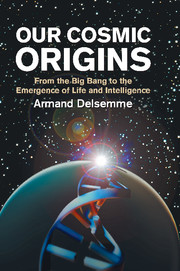Book contents
- Frontmatter
- Contents
- Foreword
- Preface
- Acknowledgments
- 1 Locating humans in the Universe
- 2 The race toward complexity
- 3 The stellar alchemy of metals
- 4 The formation of the planets
- 5 The emergence of life
- 6 The history of life
- 7 The awakening of intelligence
- 8 The other worlds
- 9 Perspectives
- APPENDIX A The standard model of the physics of elementary particles
- APPENDIX B Symmetry in physics
- APPENDIX C The strange role of time in relativity
- APPENDIX D The measurement of long time spans and the age of the Universe
- APPENDIX E The standard model of the Big Bang
- APPENDIX F The cause of the Big Bang and inflation
- APPENDIX G Chirality
- Glossary
- Bibliography
- Figure index
- Table index
- Name index
- Subject index
9 - Perspectives
Published online by Cambridge University Press: 05 August 2012
- Frontmatter
- Contents
- Foreword
- Preface
- Acknowledgments
- 1 Locating humans in the Universe
- 2 The race toward complexity
- 3 The stellar alchemy of metals
- 4 The formation of the planets
- 5 The emergence of life
- 6 The history of life
- 7 The awakening of intelligence
- 8 The other worlds
- 9 Perspectives
- APPENDIX A The standard model of the physics of elementary particles
- APPENDIX B Symmetry in physics
- APPENDIX C The strange role of time in relativity
- APPENDIX D The measurement of long time spans and the age of the Universe
- APPENDIX E The standard model of the Big Bang
- APPENDIX F The cause of the Big Bang and inflation
- APPENDIX G Chirality
- Glossary
- Bibliography
- Figure index
- Table index
- Name index
- Subject index
Summary
Man, if he is serious about it, cannot stop from trying to encroach on the region of the unexplorable. In the end, of course, he has to give up and willingly concede his defeat.
Goethe 1832 (to Wackenroder) (quoted by L. Curtis, Goethe: Wisdom and Experience, 1949)The highest happiness of man as a thinking being, is to have probed what is knowable, and quietly revere what is unknowable.
Goethe, Maxims and Reflections, 1832The evolutionary thread
This book has tried, chronologically, to tell a history of the Universe that began with the Big Bang and continues up to our existence. In spite of many uncertain details and incomplete interpretations, the remaining gaps have not obscured a clear thread of ascent toward a greater and greater complexity, going from atoms to molecules to life, from bacteria to animals to humans, from early cultures to societies to civilizations.
It now remains for us to ponder on the vistas that we have opened up, in order to try to see what they reveal, and to understand the nature of what could still be concealed. Still following the thread of chronology, as long as it remains useful, let us first consider what could have happened before the Big Bang.
The ‘Augustinian era’
In 1952, George Gamow wittily proposed calling the period that might have occurred before the Big Bang the ‘Augustinian era’, because Saint Augustine was the first to raise the question of knowing what God did before He created Heaven and Earth.
- Type
- Chapter
- Information
- Our Cosmic OriginsFrom the Big Bang to the Emergence of Life and Intelligence, pp. 245 - 276Publisher: Cambridge University PressPrint publication year: 1998

